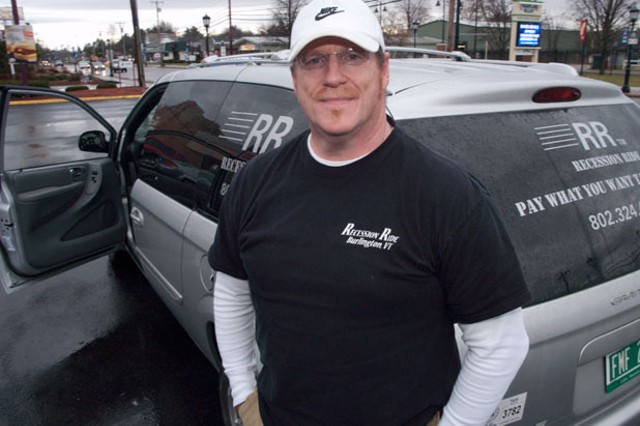Published November 30, 2011 at 8:39 a.m.
Eric Hagen had only been driving his taxi for a few weeks when he received some unsolicited feedback from the competition.
“You’re going to lose your shirt!” yelled a fellow cab driver, who’d pulled up alongside Hagen’s black SUV at a Winooski intersection.
The man, who drove for a cab company Hagen won’t name, was giving Hagen flack about the slogan emblazoned in capital letters across the rear window of Hagen’s Dodge: PAY WHAT YOU WANT. Underneath was his phone number.
That was two years ago, when the 1999 Durango’s bumper and windows were covered with those haphazardly affixed, black-on-white square stickers from Aubuchon Hardware. “It looked like a mailbox on wheels,” recalls Hagen.
Despite that cabbie’s warning, Hagen is still in business.
Recession Ride Taxi, as the name-your-price car service is called, is based in Essex, where Hagen, 48, lives. What started as a way to pick up extra cash in the middle of the recession turned into a full-time job and his first successful venture as an entrepreneur. Allowing passengers to set their own fares may have been a dubious way to build a business, but since he started in the summer of 2009, Hagen has only seen green.
The Durango is history, but the 2004 silver Grand Caravan he’s driving now is equally unimpressive. It does sport a professional-looking logo and actual appliqués on the side windows, though. And Hagen’s choice of a multipassenger minivan reveals that his taxi is in high demand. He’s even looking to expand in the next few months.
The minivan was an upgrade so Hagen could accommodate groups, as he is increasingly called on to do — he’s got contracts with youth-care services and rehab programs, for example. Those customers like the affordable rates, and Hagen likes the regular business. And it fits his original vision for Recession Ride: to help folks out.
Hagen is a hulking redhead who might look more at home in a gym pumping iron than sitting behind the wheel of a minivan all day. Before he started driving the cab, he worked for the American Red Cross. Three or four days a week, for about 12 hours a day, Hagen drove a 28-foot truck filled with the equipment and supplies needed to operate rural blood drives. He set up and took down those sites, doing inventory and processing blood donations, and returned everything to Red Cross headquarters at night.
Prior to that, Hagen worked in the world of finance, and his career there mirrored the market: His jobs were boom and bust.
In the late ’80s, Hagen had a job on the New York Stock Exchange as a wire clerk. The movie Wall Street was filming right downstairs when he started there, he recalls. Then came the 1987 stock-market crash. Three years later, Hagen moved to Vermont to work in sales for Bombardier Capital, a financing company. When GE Capital bought it, local positions were eliminated.
Hagen spent a few years as a phone-service representative for financial advisers Putnam Investments. He was out, again, when shifts in that company scuttled its work-at-home team. Next, at Homebound Mortgage in Colchester, Hagen was briefly a loan officer … and witnessed firsthand the beginning of the end of that industry.
“You could see the writing on the wall a long time before everybody else could,” he notes. Hagen left shortly before Homebound closed its doors in 2004.
“I was always surrounded by money and money management. It was always unstable,” he says. “Places were always closing down or getting bought out or getting taken over.”
The Red Cross gig was Hagen’s attempt to tap into a business with regular supply and demand. “I thought there was stability there because, you know, it’s blood, and regardless of what’s going on in the economy, or wherever you are, everybody needs blood,” he reasons.
However, as a single dad with two teenage girls, Hagen found the Red Cross job didn’t cover all his financial needs. He started mulling over the idea of a cab business.
“The initial thought was that it would be part time,” Hagen says. “If I was going to do it, I wanted it to be different, something completely out of the ordinary from what you typically see.”
Eventually, Hagen’s own troubled history in finance became his inspiration. “I kept kicking it around and [thinking] that everything we do is based on income and profit and money,” he says. “I wanted to create a business that would be helpful to not only myself — naturally, you open a business so that it can be profitable — but be a benefit to people.”
Then, Hagen says, “This pay-what-you-want taxi service came to mind. I took this business that was common and just put a twist on it.”
Within two weeks, he had registered his SUV for work and hit the streets. At first, people were incredulous. “I got a lot of calls that were, like, ‘I don’t need a ride, but is this really real?’” he says. Within a month, the Associated Press did a story on Recession Ride, and business took off.
Local hotels, notably the Days Inn, helped out by distributing Hagen’s cards and sending customers his way. For the first eight months, he drove his cab late into the night while still working those 12-hour shifts for the Red Cross. Last year he resigned and became his own boss.
Soon service-oriented nonprofits and state-run programs were contacting Hagen for affordable transportation, he says. When Recession Ride became available seven days a week, he had more work than ever.
“I think the popularity of it has exceeded what I expected,” Hagen says.
So how’s the money? Despite the ever-changing fares, Recession Ride has been in the black, Hagen says. He won’t disclose what the company has made over the past two years, but allows that now it’s “considerably more” than the $600 a week he was earning in those first few weeks.
His philosophy seems to have paid off. “I trusted people, that they would be fair with me because I was fair with them,” Hagen says.
He’s never been stiffed, and says most riders have the courtesy to ask in advance if he’ll drive them for their selected price.
“Nobody really ever gets in the car and, at the end of the ride when I drop them off, [says,] ‘Here’s a buck,’ or two bucks,” Hagen says. “They usually will say up front, ‘Look, I only have this much money. Is it possible for you to take me from here to there, would you be willing to do that?’ Of course I say, ‘Yes, I can do that.’ Other people will say nothing, and just hand me what they think the ride is worth,” he says.
“People are a lot more generous than anybody thinks,” Hagen concludes. “I think people appreciate the fact that I’ve allowed them to make a choice, and I think they are more generous because I’ve allowed them to do that.”
A ride from Essex to Burlington — a path Hagen travels often — might net about $12 (comparable to what most cab companies get from, say, the airport to downtown Burlington). But, he says, he’s done that route for $8, $10 and $15, too. “It’s hard to say — it’s always different,” he explains, and adds that he’s received calls from drivers in other states interested in trying the model.
Hagen is still on the fence about his next move. Sometime in the coming six months, he will probably add another vehicle, he says; it’s just a matter of finding the right driver.
In June, his sister, Teri Emilo-Hagen, started driving parttime for the company in Bennington, Middlebury and Rutland; Hagen says she mainly handles trips to the Burlington airport. “I thought maybe it would be good to help with a different region,” he says, but adds, “It’s very quiet down there.”
Proprietors of several local cab companies contacted for this article did not return phone calls. But Quick Cab owner George Morrill says he’s heard of Hagen’s business and isn’t too worried about the expansion of a low-cost cab service.
“You are not going to be able to operate for a lower cost than what we’re charging,” Morrill asserts. “But who knows? Maybe he can operate for nothing. That’s fine.”
Hagen believes adding another car will work. He is, however, a little cautious. Recession Ride is his first enterprise, and he’s been on the losing side before. “So many businesses have failed by getting overzealous or going beyond their means,” Hagen says. “I’m trying to keep it as simple as possible.”
More By This Author
About the Artist

Matthew Thorsen
Bio:
Matthew Thorsen was a photographer for Seven Days 1995-2018. Read all about his life and work here.
Matthew Thorsen was a photographer for Seven Days 1995-2018. Read all about his life and work here.
Speaking of...
-

Vermont to Open $20 Million Business Flood Relief Fund
Jul 27, 2023 -

Video: Following Seven Days' Paper Trail to Québec
Jun 21, 2023 -

Rochester Grocery Store to Close, Leaving Residents in the Lurch
Apr 24, 2023 -

Video: Saying Goodbye to Burlington’s Penny Cluse Café
Nov 17, 2022 -

How Family-Owned Vermont Rail System Became the Little Economic Engine That Could
Nov 16, 2022 - More »
Comments
Comments are closed.
From 2014-2020, Seven Days allowed readers to comment on all stories posted on our website. While we've appreciated the suggestions and insights, right now Seven Days is prioritizing our core mission — producing high-quality, responsible local journalism — over moderating online debates between readers.
To criticize, correct or praise our reporting, please send us a letter to the editor or send us a tip. We’ll check it out and report the results.
Online comments may return when we have better tech tools for managing them. Thanks for reading.














































